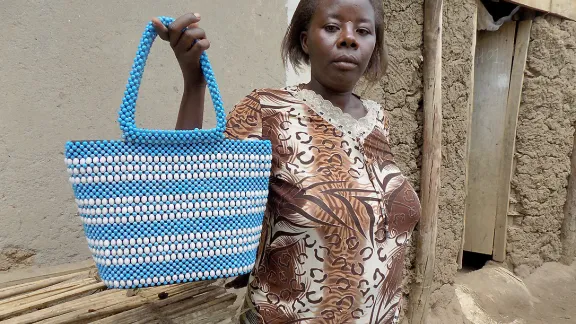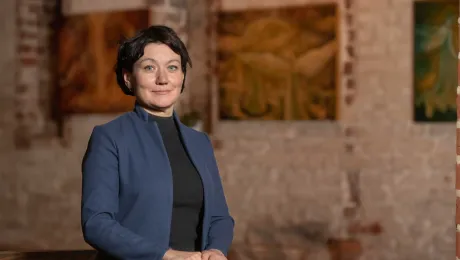
Fleeing the horrors of the DRC, Shantal quickly stepped up to become a role model in the LWF camp at Rwamwanja, Uganda. Photo: LWF Uganda
Rape survivor a tireless worker for refugee women’s rights in Uganda
(LWI) - Shantal M is a refugee from the Democratic Republic of the Congo (DRC). The mother of three arrived in Uganda in 2012 where The Lutheran World Federation (LWF) received her in Rwamwanja, in the south west.
A year later she had become a community social worker.
Shantal had fled eastern DRC after enduring the painful ordeal of repeated rape, from which she contracted HIV. Rape is used extensively as a weapon of war in eastern DRC.
With an innate ability as a social worker, Shantal soon set about voluntarily helping other women, who identified her as someone skilled at helping them solve problems, especially related to domestic violence.
“Several mothers have named their new born daughters Shantal because I helped to mediate between the women and their husbands, she said.
“When we enrolled her as an incentive worker, Shantal stood out from many. She was quick to learn and did her work as if she had been doing it for years. She is so passionate about the issues concerning refugees that she gives herself totally to work for them,” said Prosmolly, LWF officer for the focus on gender-based violence (GBV) in Rwamwanja.
Sees herself in every survivor
Shantal often speaks out against gender violence. “She sees herself in every GBV survivor,” says Prosmolly.
Rape often leaves a woman with not only an unwanted pregnancy or HIV but rejection by her husband. “Shantal has been a powerful whistle blower in terms of reporting GBV cases in the face of a lot of intimidation by perpetrators and their families,” Prosmolly says.
Defender of women’s rights
Shantal says her greatest challenge is dealing with the Congolese cultural stereotype that men are superior to women, and she is sometimes scorned for breaching her culture. “My biggest frustration comes from seeing how our women constantly feel inferior and look up to men for everything, even simple things. That is why some of them fall victim to violence or abuse.
“Women are important, men are important, we are all important and we must work together to change the negative things in our society. Some men think I am making a lot of money from this work and yet that is not true. I am paid the same amount as all other social workers,” she says.
Representing women on the national stage
Shantal provides post-test counseling to HIV positive patients who cannot cope with the condition. In 2014, she took in an 18-year-old mother of two who was diagnosed positive as a consequence of rape. She helped her overcome stigma through counselling, and ensured she kept taking her medication. She is now attending a vocational training course, supported by LWF.
“Being a social worker has opened my eyes to many things. I have been able to represent refugee women in the national UNHCR women’s empowerment seminars and take feed back to the community. I joined a HIV post-test club in 2014 and I am able to advocate for HIV prevention and positive living to those infected and affected,” Shantal says with pride.
Creating economic growth
LWF monitoring and evaluation assistant Flavia says Shantal is driven not by the stipend she receives but the desire to improve the lives of her fellow refugees. “She has no boundaries. She supports children, women and even men who are affected.”
She has managed to help to build a number of houses for single mothers without external support. “I have encouraged women to form groups and one of the groups save 25,000 shillings per month (USD 7.40), which they later borrow to start business and support their families. I encourage women to be positive in life and work hard,” she says. She also makes bags, which she sells to support her family.
Working with LWF was the best decision she ever made, Shantal says. It has changed her life.. “If I did not have this job I would be dead by now. LWF has brought me a long way and I am very grateful for I have learnt a lot from the trainings and guidance.”
Written by Betty Lamunu, Monitoring and Evaluation Manager, LWF Uganda Program


